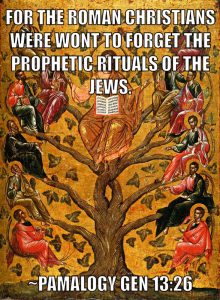GENESIS
XIII
apostolic authority and succession
1And followers of the gods everywhere at all times relied on trusted authorities to tell them the truth. 2And religious leaders among men made up stories that became ancient myths. 3And some of their traditions contained elements of truth but none were inerrant. 4But those Christians calling themselves orthodox supposed the memoirs and writings they preserved and those of the Jews before them were providentially protected by the one true God and free from error.

5And they believed Jesus was the one true God as the only eternally begotten Son of God incarnate. 6And they held the one God to be triune as Father, Son and Holy Spirit. 7And they believed the Holy Spirit of God shared the divine life with members of the Church, which they called the body of Christ. And this was how Christ reigned on Earth as in heaven. 8And they were baptized by bishops and clergymen who convinced them that there was an unbroken chain of succession of unchanged teaching from Jesus the Christ to his disciples, from the disciples to the bishops and from the bishops to others bishops to their own day.
Hegesippus
9And the original records of the succession of the Christian bishops in Rome was not kept. 10There was, however, a list of episcopal successors compiled by a certain curious bishop from Caesarea named Hegesippus who journeyed to Rome inquiring about it.
11And Eleutherus was bishop of Rome at that time and he had been deacon when Anicetus was bishop. 12And Hegesippus was able to ascertain with certainty only that Eleutherus had succeeded Soter and Soter had succeeded Anicetus, who was the Roman bishop as far back as 155 CE. 13The remainder of the list Hegesippus drew up, from the time of Peter, whom he supposed had ordained the first bishop in Rome to the time of Anicetus’ predecessor, Pius.
14And Hegesippus was contemporary with Justin, a philosopher who was likewise from Caesarea and sojourned in Rome while Marcus Aurelius was Emperor. 15And the record kept of Justin’s martyrdom in Rome suggested that Justin was unaware of any bishop there. 16And Justin was a Chiliast like Barnabas. For he likewise believed that Jesus would come to reign on Earth for one thousand years. 17Moreover, he elaborated on the fact indicating that only some wrong thinking Christians thought otherwise.
Authority of Ireneus
18And shortly after those days the bishop of Lyons visited Rome, as well, in order to settle a dispute about how and when to commemorate the death and resurrection of Jesus. 19And whereas the succession of bishops from Peter was disputable, the succession of the bishop of Lyons was not. 20For the youngest disciple of Jesus was named John. 21And John outlived the others by several decades and taught and appointed bishops. 22And among these was Polycarp, a bishop assigned to Smyna, who was acquainted with the Jewish traditions and lived to an old age before he himself was martyred.
23And before Polycarp was executed by the Romans for being a Christian, he taught and ordained Ireneus as the bishop of Lyons after the death of the elderly bishop Pothinus of Gaul. 24And Polycarp also visited Rome while Anicetus was bishop there to advocate that some of the paschal traditions held by Jewish Christians should be practiced. 25Ireneus likewise journeyed forth to Rome as well for the same purpose and utilized the authority of the elders he had learned from, especially Polycarp, to persuade Victor, who succeeded Eleutherus as bishop there, not to forget the teachings of Polycarp or the authority of the elder John, the disciple of Jesus, who taught him. 26For the Roman Christians were wont to forget the prophetic rituals of the Jews.
heresy of the Roman bishop Callistus
27And it came to pass that the words of Ireneus and of Polycarp were persuasive for a time but not long after Victor, the Roman bishops Zepherynus and Callistus were both accused of heresies by a pupil of Ireneus named Hippolytus. 28For Hippolytus had documented every known heresy at the time as his mentor in the Christian faith, Ireneus, had done before him up to his own time. 29And behold, the extent to which Hippolytus faithfully followed Ireneus can be assessed by comparing their respective works against heresies since complete multi-book versions of both have survived to this day.
30And Callistus succeeded Zepherynus as bishop of Rome after Victor died but any episcopal authority associated with the Roman succession escaped the interest of Hippolytus. 31For there exists no surviving record of his holding any such opinion. 32On the contrary, in his ninth book against all heresies Hippolytus accused Callistus of many wrong doings from the time he was a servant of Carpophorus, a Christian in the household of Caesar Commodus. 33For Callistus, Hippolytus claimed, had accepted money from many on behalf of his master to protect it as a banker but then absconded with it and was sentenced to exile in Sardinia for his crimes. 34And Hippolytus elaborated, saying that Callistus then returned to Rome and befriended Zepherynus. 35And Zepherynus, Hippolytus said, was undiscerning, and made Callistus a priest even though he was sympathetic to the heresy of Noetus. 36And this last error was, in the view of Hippolytus, his worst offense.
heresy of Noetus
37And this is the record of the heresy of Noetus according to Hippolytus and Ireneus. 38It is the belief that the Son and the Father are one person as one Logos, appearing as one or another as an expression of one God depending on time and circumstance. 39And Callistus learned this teaching from Cleomenes. 40And Cleomenes learned it from Epigonas. 41And Epigonas learned it from Noetus and carried it to Rome. 42And Noetus, who was from Smyrna, taught essentially the same thing as Heraclitus, who said that even the darkness and the light and goodness and evil were one. 43For creation is one and God is united with creation, he taught.
44And according to Hippolytus, Callistus managed to hide his heresies from Zepherynus and gained favor with others by expressing doctrines in ways that they accepted, saying one thing to one audience and the opposite to another, sometimes leaning to the heresy of his contemporary Sabellius and at others to that of another type of heretic, Theodotus, who believed that Jesus was a man who became God through adoption in baptism and by rising from the dead 45Thus Hippolytus was not impressed with Callistus. Even so, Callistus became bishop of Rome after Zepherynus died.
orthodoxy versus succession
46And it came to pass in the days when the bishops of Rome were regarded as having greater authority than all other bishops in the centuries which followed, Hippolytus came to be regarded as a competing pope. 47And competing popes were called antipopes. 48And thus is history written by those wielding power. 49For although Ireneus had enumerated an unbroken succession of Roman bishops as proof there was continuity in Christian thought throughout the world, in his own writings Hippolytus did not ever make any such claim nor indicate that the bishop of Rome ought to possess any particular authority compared to any other bishop. 50Rather, authority was determined by orthodoxy and by maintaining what was always taught by Jesus and his disciples.
Septi Millennialism of Hippolytus
51And the records of Hippolytus were written in the beginning of the third century of the Christian era no later than 235 CE. 52And he was a Chiliast like Ireneus before him, believing Jesus would return to Earth to reign as king for one thousand years. 53And like Barnabas, he was a Septi Millennialist.
54And Hippolytus determined the date of creation based on the Greek Septuagint translations, elaborating on his opinion that the world was 5,500 years of age at the birth of Jesus the Christ. 55He thus expected the Christ to return to the Earth 265 years after his own death. He did not expect, as so many others have done in the past, that the return of the Messiah would take place in his own lifetime.
<< PGen Ch12<< || PGen Index|| >>PGen Ch14>>
